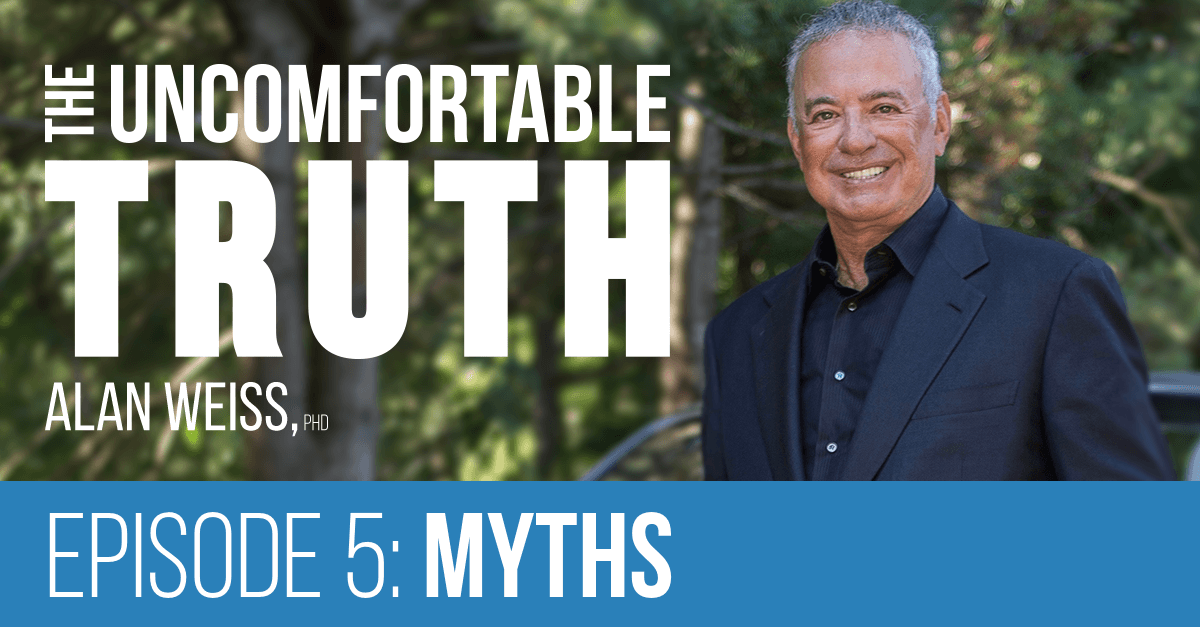
Episode 5: Myths
A memorial service to the many friends you lost when they went swimming 55 minutes after having lunch.
Transcript:
Hey, I’m Alan Weiss. This is about myths. Remember, we used to have monsters under the bed? I never found one; I even used a flashlight a few times. In the closets too, but we don’t read in the headlines people dying from monsters under the bed. So, it’s probably not the case.
Remember when we couldn’t swim for an hour after eating? We actually sat on the beach, and at about 53 minutes after lunch, we’d say seven minutes left, and if somebody went in too early, or attempted to, we’d stop them, because you don’t want somebody drowning and sticking to the bottom because they went in 59 minutes instead of 60.
There are modern myths too, however. Such as, today is forever. We think we’re trapped in amber. We think this is a snapshot that lasts internally, instead of being part of a motion picture. What you see today is not forever; in fact, the beginning of this podcast has already disappeared.
We believe that the metrics to which we aspire are fair, when they are often someone else’s. Who determines that a certain ranking on a test merits you a certain benefit, or gets you a certain entry?
Hospitals are safe we think; yet, something like 40% of deaths in hospitals are iatrogenic. Iatrogenic meaning the death was caused by an illness procedure in the hospital. We think that all professionals are skilled; yet, my doctor told me when my urine was red that I had bladder cancer. A urology specialist told me I had just eaten too many beets and to go home, and get out of his office. When I told him about my personal physician he said two things, one, he must have missed that day in medical school; and two, get yourself another doctor, which I did.
We tend to believe that executives are above politics, that they’re above emotion, above ego, and above poor choices. They’re not. They have the same ego, and the problems, and the same emotional disturbances as the people on the shop floor, or the salespeople, or the people in accounting, or R&D. They’re simply playing with more money.
We tend to think that the audience is critical. The audience is not critical. The audience comes for a good performance. The audience comes to say, “That was a great hour I just spent,” or “A great day.” No one, except the terminally personality distorted, wants to go home and say, “What a great day. The guy burned out. The woman was horrible. I really enjoyed it.” I mean those are the people who pull wings off flies. So, the audience isn’t critical; they’re for you.
A myth that we have is that a writer’s block is an actual phenomenon. It’s not. There’s no such thing. You sit at a keyboard and you type a letter and you type a letter, and then a couple of more letters you have a word, a space, a couple of more words you have a sentence, a space, a couple of more sentences you have a paragraph, and it turns out better than you think. There’s no such thing as writer’s block.
We tend to think, mythologically, that we can drive fast and close due to our superb reflexes, and so on the interstate you’ll find somebody doing 75 MPH, about three car lengths behind the car in front of them, and about three car lengths ahead of the car behind them; and I got news for you, if the person in front of you slams on the break, there is no physical way in the universe, there is no law of physics in the world that will allow you to stop in time. I don’t care how fast your reflexes are. Similarly, if you slam on the breaks, the person behind you will hit you. These are acts of faith, and believe me, mythology acts of faith in this case.
You wise up in second marriages. Now, there’s a piece of mythology. The rate of divorce in second marriages is worse than the rate of divorce in first marriages; and guess what, the rate of divorce in third marriages is worse than the rate in second marriages. Why? Because we keep looking for and finding the exact same person.
Suffering is required with loss and pain. It’s not. Pain is involuntary. Suffering is voluntary. And so, we have certain rituals, like sitting shiva, or a wake to confine our suffering to a certain period, and then get on with our lives. Some people choose to suffer forever but that’s a choice. Pain is hard to escape. Suffering, that’s voluntary.
Another myth is that self-esteem, once acquired, is automatically sustained. It’s not. Self-esteem has to be worked on, like a muscle. Just like you’d work out physically each day. And so, daily, you have to work on your self-esteem. Prove that you have high self-worth. Prove that you’re good. Be resilient. Step on past defeat and setback. It’s not a one-time thing.
We have a myth that others will feel our pain. It seems to be very true on Facebook, but it’s not. Very few people are truly empathetic. And there’s an old quote, I think it’s by Hemingway, I’m not sure, but what this person said was, “When you’re cold, don’t expect sympathy from someone who’s warm.”
We have a myth that people usually act based on logic. They don’t. Logic makes people think, but emotion makes them act. If you want a buyer to make a decision, involve the buyer emotionally. If you want to make a key decision, especially after a traumatic time, sit back and wait. Don’t make a decision based on the emotions of the moment; deliberately involve your intellect.
We tend to think that confrontation is bad and consensus is good. That’s not true. Too many leaders try to be consensus leaders and don’t make the tough decisions, and they hem and they haw, and they go on forever, or they let people who are threatened make the decision, “No, we don’t want this person in there. They might find out that we’re not doing a good job.” And confrontation is healthy when you get it out on the table. You know, Hewlett-Packard used to say, “Let’s get the dead rat on the table. Something smells in here. Let’s acknowledge it.”
The myth is that you feel better knowing someone else is worse off, and that’s not really true. You know, we count our blessings and we say, “Well, at least I’m not her. At least I’m not him. At least I’m not over there. At least I didn’t do that,” but really, we’re more often looking at people that have more than we do and saying, “I wonder how I get there.”
We have a myth that crime in the US is increasing. It’s not. Crime in the United States is decreasing, especially major crimes like murder, and car theft, and so forth. And so, major crime is decreasing, kidnapping. Petty crime might be increasing in some areas, but not major crime. New York is, the last I saw it, the safest large city in the world.
There’s a myth that protests on the streets will create change. They don’t. The 1% people, the Occupy people, remember them? They did nothing really. Accomplished nothing except burned some cars, and broke some windows, and looted some stores, but nothing really happened. It’s wonderful to get on the streets and have a million person march, but the key is to make something change; and too often the march itself, being on the streets exhausts the energy, and there’s no more energy to create the needed change.
A myth is that you can attribute traits to entire generations. Millennials, Gen X, Gen Y, Boomers, the greatest generation, that’s crap. People in generations, no matter what one you’re in, are individuals. They’re not people you simply set up as though clones of each other. I like to regard people as distinct, and I don’t think you provide generational painting of these people.
The myth is that a major sport that we see on TV is the most popular in the world. People in the US would say it’s either football, or perhaps baseball. People elsewhere would say it’s soccer, which they call football. But actually, the most popular sport, recognized sport in the world, is birdwatching. Go look it up.
There’s a myth that lobsters are tougher the larger they get. It’s completely untrue. Lobster meat depends on how you cook it. And if you cook it correctly, and that is steam it, the way to have a lobster is not broiled or boiled, it’s steamed, lobsters are quite good no matter how big they are. On Father’s Day, my wife routinely treats me to a seven pound lobster here in Newport; and they’re delicious, because Newport at the moorings knows how to cook them in very large pots. By the way, no one knows how long lobsters live but that’s a story for another time.
The myth is that Abner Doubleday invented baseball. He did not. He took credit for it but he did not. James Naismith, on the other hand, did invent basketball. Tuck that away for future use.
Another great myth is that Napoleon Hill, “Think and Grow Rich,” was a wise philosopher and philanthropist. He wasn’t. He was a womanizer, and a drunk, and a conman. He cheated people all over the country. He would align himself close to Thomas Alva Edison to get into a picture with him, and then claim that he was discussing business with him. He claimed that he interviewed Andrew Carnegie, and a great deal of his findings come from the Carnegies. Not true. All of it false. The only book he wrote that really generated profit was “Think and Grow Rich,” and he used up all the royalties from that, W. Clement Stone finally had to bail him out. I knew W. Clement Stone.
There’s a myth that vaccines cause autism. Please, the science is quite clear. If you want to quote science about climate change, I might as well quote it about vaccines. They do not cause autism.
There’s a myth that motor skills are flexible. But they’re really not so much. If you don’t believe me, fold your hands, and then fold your arms. What you’ll find is you always put the same thumb on top and always put the same arm on top. You never change unless you consciously do it. You revert to conscious competency. Motor skills are not as flexible as you think. Be careful about your thinking skills, therefore.
There’s a myth that it makes a difference in terms of which order you brush your teeth or you floss. Dentists are divided on this, Guess what? 50/50. Floss first, brush first, doesn’t matter. It’s sort of like the toilet tissue. Come over the top or under the bottom, doesn’t matter. Same thing.
There’s a myth that the “Star Spangled Banner” and “My Country, ‘Tis of Thee” are original tunes, based on the same kind of tune. But they’re actually old drinking tunes that were adapted for these reasons.
A myth is that all states in the United States use the same English basis, same legal basis, English, I would hope, the same legal basis, which is English Common Law, but in fact, Louisiana uses the Napoleonic Code.
There’s a myth that forest fires are always bad. They’re not. Forest fires, which have taken place long before we got here, and often out of control after we got here, rejuvenate forests. One of the things they do is they get rid of, no pun intended, old wood. And after the fire, when what seems like devastation, invites in new seeds, new species, new insects, and birds, and animals of all kinds. Forest fires are only bad because we’ve moved into the habitat of forests and they threaten our homes.
There’s a myth that airplane lift is caused by the power of the engines. It is not. It’s caused by the curvature of the wings. Hence, if you take a look at a bird’s wings, they’re not flat, and they curve on the top, which helps them get lift, and which helps them just float it seems with great ease in the highest of winds because the stronger the wind, the more lift, they don’t have to flap their wings.
There’s a myth that a black panther, that huge gorgeous black cat, is a species. It is not. It’s simply a type of leopard whose spots are all together; hence, it’s black. Yes, that’s true.
There’s a myth that filet mignon is the most flavorful steak. It’s the tenderest of steaks, but not the most flavorful because it has no marbling. That would go more toward a rib eye.
There’s a myth that free range chicken tastes better; yet, a blind taste test of chefs in New York City turned out that they couldn’t tell the free range chicken from the normally cooped up chicken. I’m not defending or condemning the way chickens are kept. I’m just telling you that free range chicken, whether they pump weights or do laps, doesn’t improve the taste. At least the chefs couldn’t tell.
There’s a myth that oil reserves are diminishing. In fact, there are more reserves today because of better exploration, and better technology to extract reserves than there were in the 1950s. Which is why the United States today is pumping more oil in Saudi Arabia, and is the biggest energy producer in the world, bigger than Russia.
There’s a myth that any naval gunboat is a battleship. That’s not true. It might be a cruiser, or a destroyer, or any kinds of things, but it’s not a battleship. We have no more battleships. The last battleship in service was the Iowa Class. The Iowa, and the New Jersey, and the Missouri, and the Wisconsin, and they were retired some years ago. Some saw action in the Gulf War. But those were the last of the actual battleships.
There’s a myth that, “We’re better than them,” is correct language. Actually, we’re “Better than they.” The way you test this is you add the verb, “We are better than they are,” not, “We are better than them are.”
There’s a myth that money is a motivator. The absence of money is a de-motivator but the presence of money is not a motivator. In fact, if you give a unhappy employee more money, you simply have a wealthier, unhappy employee. People like Herzberg, and McClellan, and others called these “hygiene factors,” not so much motivators.
There’s a myth that stress should be eliminated. You can’t eliminate stress. Some stress is positive; it’s called “you stress.” Stress is what creates a sense of urgency, gets the adrenaline flowing. So, we don’t want to eliminate all stress; we want to manage stress.
There’s a myth that money is wealth. Discretionary time is wealth. Money is just the fuel. Your ability to go where you want, when you want is true wealth. Which is why owning your own company, and/or being an entrepreneur puts you in such a better place to be wealthy than working for a large organization, even making a million or more a year, when you’re working 80 hour weeks and the board is telling you what to do.
There’s a myth that the experts are usually right. No, experts are usually provocative, but not usually right. Just take a look at the money managers. Take a look at the prognostications for 2016 and 2017; I’ll bet 90% of them were wrong.
There’s a myth that World War II was our most costly war in deaths, but it wasn’t. The Civil War was. About 800,000 people died in the Civil War. Nothing’s come close to it since.
There’s a myth that Johnny Carson began the Tonight Show. He did not. It began before him Jerry Lester, and then Steve Allen, and then Jack Paar.
There’s a myth that public restroom toilets are germ laden, but tests show that there are more adverse nasty germs on the door handle to the restrooms than on the toilets. By the way, in Asia in some places, as you leave a restroom, you take a little wet cloth, which you use to open the door handle, and on the other side there’s a repository to throw it away. Pretty good thinking.
There’s a myth that IQ tests measure intelligence. They don’t. They measure the ability to pass that kind of a test. I spoke about this at the top of this broadcast. Some of the people I’ve in Mensa, the high IQ organization, are about as dumb as you get.
There’s a myth that bumble bees should not be able to fly. That is a myth. They are adequately aerodynamic, and so we need to stop talking about that nonsense.
There’s a myth that supply and demand determine your fees, and of course that’s not true. Value determines your fees.
There’s a myth that you have little control or influence in terms of your life, but you have a great deal of control and influence over your life. You just have to understand the tools to use and what behaviors you need to make it happen. This is not a fatalistic, Calvinistic, predetermined life.
And finally, there’s a myth that dogs give you unconditional love. They don’t. They just tolerate you for their own best interest.







Craig Ellis
Thoroughly enjoyed the article. You might enjoy a book called “The Experts Speak” which is an extensive listings of all the so-called experts saying things that turned about to be completely wrong. One thing you did mention was “A myth that we have is that a writer’s block is an actual phenomemon. It’s not. There’s no such thing.” which had me wondering because I have a 188 pg book complete with CD entitled “Breaking Through Writer’s Block.” I think you might know the author. 😉
Alan Weiss
That’s why it’s called “Breaking Through….”
Craig Ellis
Tried to delete this glitch, but no success.